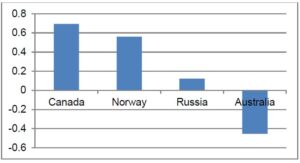Organizations:
People:
Topics:
Josty: Canada is more just than a hewer of wood and drawer of water
Mark LoweyJuly 27, 2022
By Peter Josty
Canada is often described as a resource-based economy or, less kindly, as a hewer of wood and drawer of water. But is this really true? As a resource-based economy Canada is often compared with countries like Australia, Norway and Russia. But look at the graphic below (Source: Source: Harvard Atlas of Economic Complexity).
This graphic shows a measure for each country called the Economic Complexity Index. This index is a ranking of countries based on the diversity and complexity of their export basket.
High-complexity countries are home to a range of sophisticated, specialized capabilities and are therefore able to produce a highly diversified set of complex products. Low-complexity countries export more undifferentiated commodities and simpler products.
The reason this index looks at exports, rather than total production, is that exports are seen to be a measure of international competitiveness, and allow better international comparisons.
So, Canada is far from being a hewer of wood and drawer of water. We have a much more complex export mix than Australia, Norway and Russia.
Broadly speaking, richer countries usually have more complex exports. The highest-ranked countries according to this index are Japan, Switzerland, Germany, South Korea and Singapore. The U.S. ranks No. 11 out of 133 countries. The lowest-ranked countries are Venezuela, Cameroon, Papua New Guinea, Liberia, Guinea and Nigeria.
The comparison with Australia is particularly interesting as Australia is often seen as a twin for Canada. Canada ranks No. 36 out of 133 countries in this ranking (and is growing more complex), and Australia ranks No. 88 (and is growing less complex.)
That is a huge difference, and is explained by the fact that a much larger proportion of Australia’s exports are “simple” compared to Canada. Well over half of Australia’s exports are commodities such as iron ore, coal, petroleum and gold. The corresponding number for Canada is roughly half that, with exports of petroleum, gas, gold, lumber and wheat. Canada has significant exports of complex products such as cars, car parts, ICT, machinery, medications and plastics.
The researchers place the diversity of tacit knowledge – or knowhow – that a society has at the heart of its economic growth story. Research from the Harvard Growth Lab finds that countries whose exports are more complex than expected for their income level grow faster. So, according to this approach Canada would be expected to grow faster than Australia.
This is true, with Canada’s growth to 2029 estimated to be 3.06 per cent per year, compared with 2.17 per cent for Australia. (These estimates were made before COVID-19, so take them with a grain of salt.)
The Harvard Growth Lab has an interesting view on economic development. They see that countries grow by diversifying into new products of increasing complexity. So, the more complex your export mix the more opportunities you have to grow into adjacent areas. Some examples from Canada could be:
- Oil and gas firms developing other energy sources such as geothermal energy, which exploits their drilling and energy expertise;
- Automobile firms making electric vehicles, exploiting their manufacturing expertise;
- Forestry firms using drones for reforestation, tapping their expertise in forestry;
- Energy firms expanding into hydrogen production to exploit their expertise in natural gas and related technologies such a carbon capture and storage; and
- An historical example is Shell getting into GPS technology to know where they were drilling, and subsequently spinning off the business that seeded the formation of the Calgary GPS cluster.
The conclusion? Canada has a much more complex economy than we realize. The idea of using the diversity of tacit knowledge to diversify into adjacent areas is an interesting one that should receive more attention. It’s probably a much more robust approach than trying to attract unrelated businesses to set up here.
Peter Josty is Executive Director of The Centre for Innovation Studies (THECIS), a Calgary-based not-for-profit research company specializing in innovation and entrepreneurship. In addition to working in private research and business development, he holds a PhD in chemistry from the University of London and an MBA from the International Institute for Management Development in Geneva.
R$
Events For Leaders in
Science, Tech, Innovation, and Policy
Discuss and learn from those in the know at our virtual and in-person events.
See Upcoming Events
By using this website, you agree to our use of cookies. We use cookies to provide you with a great experience and to help our website run effectively in accordance with our Privacy Policy and Terms of Service.




